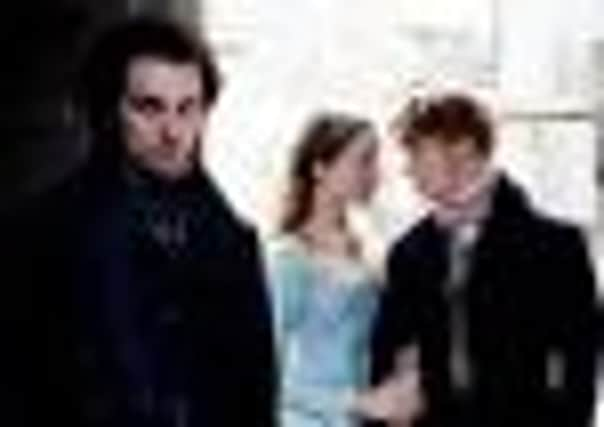TV preview: The Mystery Of Edwin Drood | Borgen | Coppers


Having written roughly half of it before dropping dead in 1870, the conclusion of this torrid murder saga remains in itself a great literary mystery; one which has inspired many writers to pen their own speculative continuations over the years.
The latest to tackle this perhaps unenviable task is Gwyneth Hughes. Since there can be no definitive agreement on Dickens’ intentions, her imaginative interpretation is as valid as any, and while the swooping twists and turns she provides will doubtless have some scholars up in arms, that’s surely part of the fun.
Advertisement
Hide AdAnd fun it most certainly is, with Matthew Rhys on magnetic form as jaded cynic John Jasper, an opium-addicted choirmaster caught between the sacred and profane, whose obsession with the beautiful Rosa has driven him half-mad with desire. Haunted by a fever dream in which he murders his cocky young nephew – and Rosa’s fiancée – Edwin Drood, Jasper emerges as a sinister yet weirdly pitiable anti-hero.
The forces of good, meanwhile, are represented by Rory Kinnear as Jasper’s employer, the kindly Reverend Septimus Crispsparkle (the most Dickensian name in the whole Dickens canon?), who plays well-meaning host to a pair of orphaned Asian siblings newly arrived from a Christian missionary. Resentful products of an Empire ruled by the arrogantly entitled likes of Drood, they add another hot-tempered ingredient to an already broiling cauldron of psychodrama.
With a cast which also includes Alun Armstrong and Julia Mackenzie, this sterling adaptation functions not only as a pointed social satire of Victorian prejudices, but primarily as a vivid rumination on destiny, regret, guilt, envy and romantic obsession. Plus, you’ll be pleased to hear, it also features the requisite employment of soot-faced urchins, wretched hags, drunken worthies and sepulchral crypts. That’s Dickens!
In the understandable hope of emulating the sleeper success of imported crime drama The Killing, BBC 4 has snapped up borgen, a steely political drama from the same Danish broadcaster and production company.
Already a hit in its homeland, and with a clutch of awards to its name (an American remake is inevitably in the works), the opening double-bill suggests it may prove as addictive as its gloomy stable-mate. Another female-fronted ensemble piece, Borgen – which roughly translates as “castle” or “fortress” – centres around Birgitte Nyborg, the middle-aged leader of a Moderate party who, just days before a general election, dramatically withdraws support for her coalition partner following the unplanned announcement of his hard-line stance on immigration.
But she then finds herself caught betwixt a devastating political scandal involving a troubled government and an opportunistic opposition, which could potentially have far-reaching implications for her own political career.
Advertisement
Hide AdResembling a cross between a more serious The Thick of It and The West Wing without the corn, Borgen takes a cool overview of modern European politics and judges it a blandly-attired, image-conscious landscape focused less on ideology and more on marketing and media spin. That’s with the noble exception of the commendably principled Nyborg, of course, who despite being a somewhat idealised creation, is nevertheless a strong and sympathetic central character.
Sharply written and performed, Borgen is absorbing from the off. Even if you don’t have in-depth knowledge of the Danish political nexus – and let’s face it, you probably don’t – it’s not hard to follow once you realise that in Denmark, “Liberal” and “Labour” don’t have the same meanings as they do in the UK. Not that they mean anything here anymore either. Am I right, folks? SATIRE.
Advertisement
Hide AdFinally, if you caught the first series of observational documentary coppers last year, then you’ll know what to expect from the follow-up, in which Britain’s police drones open themselves up to perhaps surprising levels of scrutiny.
And yet it’s understandable that, after being beset over the last year by severe budget cuts, plummeting morale, increased civil unrest and further accusations of corruption, the police men and women featured seem to relish the opportunity to tell their side of the story.
Candid to a fault, they come across as unapologetically cynical, weary, unsentimental and pragmatic, whether dealing with essentially harmless yet tiresome recidivists or – in one particularly sobering sequence – serious sex offenders.
Some express longing, only half-jokingly, for the days of 70s-style rough justice, away from the meddling binds of bureaucracy. “It is a game,” admits one detective. “It’s cops and robbers for grown-ups.” His sardonic humour is typical of his colleagues, who appear to use it as way of protecting their sanity. Because it’s not all fun and laughter. “I hate the smell of death” says the same detective sadly, upon discovering the remains of a suicide victim. “It f***ing honks.”
What sets Coppers apart from most documentaries of its type is that it doesn’t always present its subjects in an entirely flattering light. And its subjects probably couldn’t care less either way. Amusing and depressing in roughly equal measure, it’s as honest a depiction of policing and the realities of crime as you’re likely to see on TV.
THE MYSTERY OF EDWIN DROOD
Tuesday and Wednesday, BBC2, 9pm
BORGEN
Today, BBC 4, 9pm
COPPERS
Monday, Channel 4, 9pm